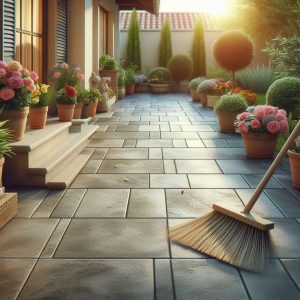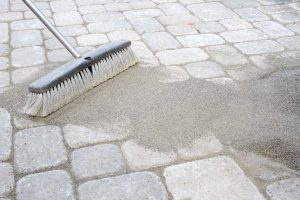Preventing Weed Growth on Paver Patios
To prevent weed growth on paver patios, maintain them regularly by sweeping and proper installation. Utilize techniques like pouring baking soda over the patio to control weeds. Manual weeding, focusing on root removal, is effective for immediate removal. Consider using homemade herbicides like vinegar or salt solutions for natural weed control. Additionally, pressure washing and applying polymeric sand can help prevent weed regrowth in the long term. Ensuring a stable base and regular sealing further protect against weeds sprouting. Implementing these methods will maintain a weed-free paver patio.
Key Takeaways
– Proper base construction minimizes weed growth between pavers.
– Regular sealing of paver joints prevents weed seed settlement.
– Polymeric sand application hinders weed growth by creating a solid barrier.
– Use homemade herbicides like vinegar or salt for natural weed control.
– Maintain correct water flow to deter weed growth in patio cracks.
Regular Maintenance for Weed Prevention
Regularly sweeping and properly installing paving slabs are vital steps in preventing weed growth between paver patios. Individuals can effectively manage weeds by engaging in regular upkeep without relying solely on weed-killing products. Implementing preventive measures like ensuring correct water flow and using techniques such as pouring baking soda over the patio can aid in weed control strategies. Additionally, keeping seeds from settling between cracks is essential for maintaining a weed-free patio environment.
To manage weeds efficiently, homeowners should prioritize their paver patio maintenance. By incorporating these weed control strategies into their regular upkeep routine, individuals can greatly reduce the need for chemical weed management solutions. Taking proactive steps to prevent weed growth between paving slabs not only enhances the aesthetic appeal of the patio but also minimizes the time and effort required for weed eradication.
Manual Weeding Techniques
Engaging in manual weeding techniques is an effective way to address weed growth between paver patios. When opting for organic solutions, individuals can prioritize root removal to prevent regrowth. By pulling weeds from the roots, one tackles the issue at its source, promoting sustainable practices. This method not only aids in immediate weed prevention but also discourages future weed growth. To save time while manually weeding, individuals can dampen the area to loosen weeds, making the process more efficient. While manual weeding is a time-consuming process, it serves as a short-term solution for immediate weed removal. By incorporating these time-saving methods and focusing on root removal, individuals can effectively combat weed growth between paver patios in a sustainable manner. This approach aligns with environmentally friendly practices and can be a stepping stone towards a weed-free patio environment.
Chemical and Natural Remedies
Using chemical and natural remedies can effectively combat weed growth between paver patios. For eco-friendly solutions, consider homemade herbicides or organic weed killers. Homemade herbicides, like vinegar or salt solutions, offer a natural approach to weed control. Vinegar acts quickly to kill weeds, while salt can dry out and weaken weed roots. These options are environmentally safe for DIY weed control. Organic weed killers are another alternative, providing effective long-term weed management without harmful chemicals. When choosing between vinegar and salt, consider the specific needs of your patio and the level of weed infestation. Implementing these natural remedies helps prevent weed growth and contributes to a safer environment for your outdoor space. Opting for DIY weed control methods ensures a more sustainable approach to maintaining your paver patio.
Using a Pressure Washer and Polymeric Sand
 Consider utilizing a pressure washer and polymeric sand to combat weed growth between paver patios. When using a pressure washer, it is important to take precautions to avoid damaging the pavers and surrounding areas. One should be cautious of potential sand staining and use a rotating surface cleaner attachment for a more uniform cleaning process. Polymeric sand offers numerous benefits, including preventing weed regrowth due to its hardened nature when sprayed with water. Unlike regular sand, polymeric sand deters weeds from taking root between pavers. When applying polymeric sand, following the manufacturer’s instructions carefully is essential for best results. The pressure washer proves to be effective in killing weeds and cleaning pavers efficiently. At the same time, polymeric sand is a long-term solution to prevent weed growth compared to regular sand, making it a reliable choice for maintaining weed-free paver patios.
Consider utilizing a pressure washer and polymeric sand to combat weed growth between paver patios. When using a pressure washer, it is important to take precautions to avoid damaging the pavers and surrounding areas. One should be cautious of potential sand staining and use a rotating surface cleaner attachment for a more uniform cleaning process. Polymeric sand offers numerous benefits, including preventing weed regrowth due to its hardened nature when sprayed with water. Unlike regular sand, polymeric sand deters weeds from taking root between pavers. When applying polymeric sand, following the manufacturer’s instructions carefully is essential for best results. The pressure washer proves to be effective in killing weeds and cleaning pavers efficiently. At the same time, polymeric sand is a long-term solution to prevent weed growth compared to regular sand, making it a reliable choice for maintaining weed-free paver patios.
Importance of Proper Base and Sealing
The foundation and sealing of paver patios significantly impact weed prevention and overall durability. Base stability is vital in preventing weeds from sprouting between pavers. A dense base, like a six-inch crushed concrete layer for driveways and three to four inches for patios, guarantees proper drainage and locks the pavers securely. The coarse texture of the base acts as a barrier against weed growth. Sealing benefits extend beyond aesthetics; it prevents weed seeds from settling in joints and sprouting, providing long-term protection. Reapplying sealer every 2-5 years maintains effectiveness, protecting pavers from fading, weathering, and ant infestations. The sealer also repels stains and locks in the sand between pavers, ensuring a secure fit. For the best weed seed prevention, a combination of a stable base and regular sealing is essential to maintain the integrity and longevity of paver patios.
Frequently Asked Questions
Can I Use Regular Sand Instead of Polymeric Sand for Weed Prevention on Paver Patios?
Regular sand is less effective than polymeric sand for weed prevention on paver patios. Opting for polymeric sand, which hardens and deters weed growth, is vital for long-term paver maintenance. Consider natural remedies and DIY solutions for enhanced weed prevention.
How Often Should I Reapply Sealer on Paver Patios to Prevent Weed Growth?
Proper maintenance is essential for paver longevity. To prevent weed growth, regularly reapply sealer on paver patios. Follow a maintenance schedule to guarantee effective weed prevention and protect the integrity of the pavers over time.
Is It Safe to Use Herbicides on Paver Patios to Control Weeds?
Using herbicides on paver patios for weed control may raise concerns about the environmental impact. Natural alternatives, DIY solutions, and seeking professional advice can provide effective, long-term weed prevention without compromising safety or sustainability.
Can I Use Vinegar or Baking Soda to Prevent Weed Growth Between Paver Patio Cracks?
Proper application is key when considering natural alternatives like vinegar or baking soda for weed prevention between paver cracks. While these DIY solutions may offer short-term relief, their long-term effectiveness and environmental impact vary.
Will Pressure Washing My Paver Patio Damage the Pavers or Affect Weed Prevention?
Pressure washing a paver patio poses risks like damaging pavers. Concerns about paver longevity arise. Alternatives for weed prevention include polymeric sand. Regular sealer application every 2-5 years is essential. Use herbicides cautiously for effective weed control.






